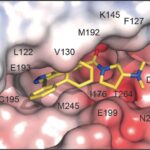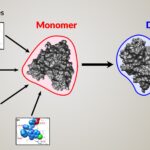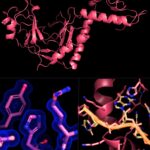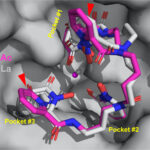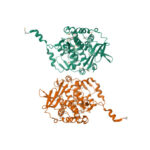Researchers at the Baylor College of Medicine identified a small-molecule protein inhibitor that blocks an enzyme that is key to male fertility. Protein crystallography performed at the Advanced Light Source (ALS) beamline 5.0.2 provided valuable structure-activity insights.
Time-Resolved SAXS Screen of Small-Molecule Drug Candidates
A team of researchers developed a high-throughput drug-discovery workflow leveraging time-resolved small-angle x-ray scattering (SAXS) capabilities at the Advanced Light Source’s (ALS) Structurally Integrated Biology for the Life Sciences (SIBYLS) beamline to identify small molecules capable of activating biomolecular dynamics associated with a desired therapeutic outcome.
Structural Biology Brings Chemotherapy Resistance Into High Resolution
Biosciences researchers conducted the first ever structural analysis of a key protein involved in DNA damage repair and cancer. While the narrative around cancer chemotherapy has historically focused on DNA damage repair pathways, findings from this study underscore the role of RNA-mediated processes on chemotherapy response, which could have major implications for cancer treatment outcomes.
Caught in the Actinium
Berkeley Center for Structural Biology beamline scientists contributed their expertise to a structural study of the radioactive metal actinium led by the Chemical Sciences Division’s Rebecca Abergel.
Researchers Gain Mechanistic Insight into a Viral-factory Protein
A team that included Banumathi Sankaran of the Molecular Biophysics and Integrated Bioimaging Division studied a protein called σNS, an important component of some viral factories. Understanding how this protein works will foster development of therapeutic strategies against viruses that use similar proteins to replicate.
Was this page useful?


